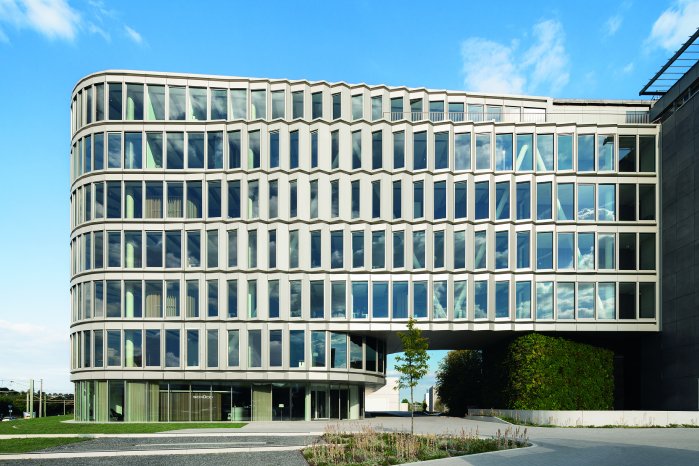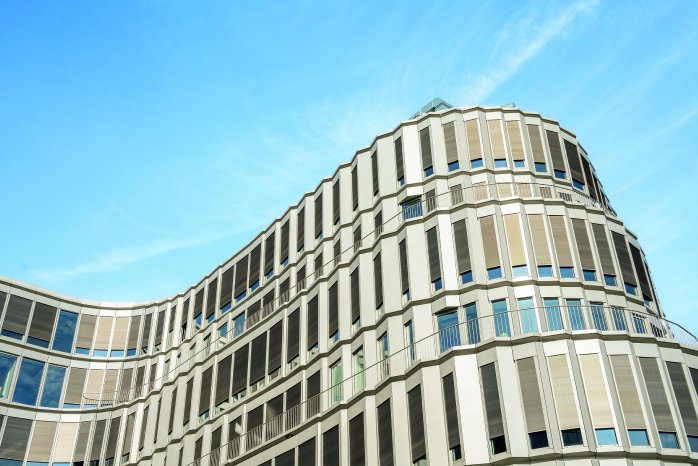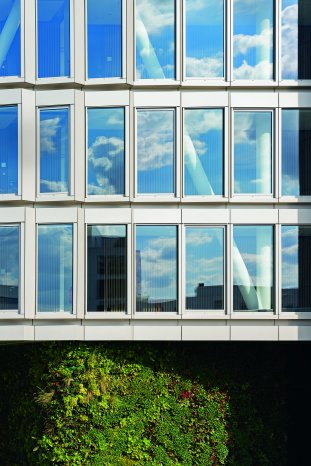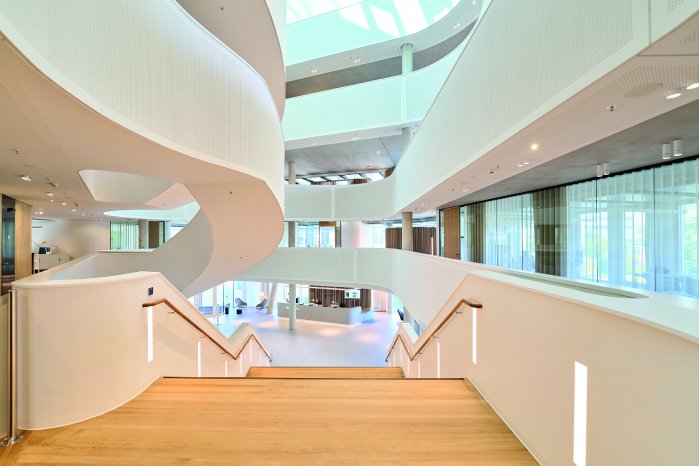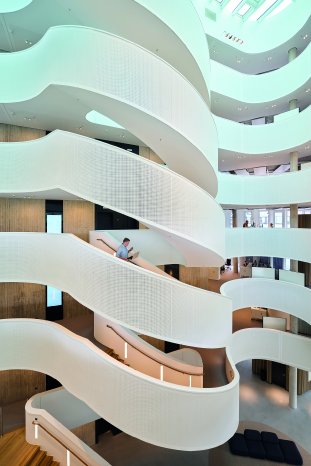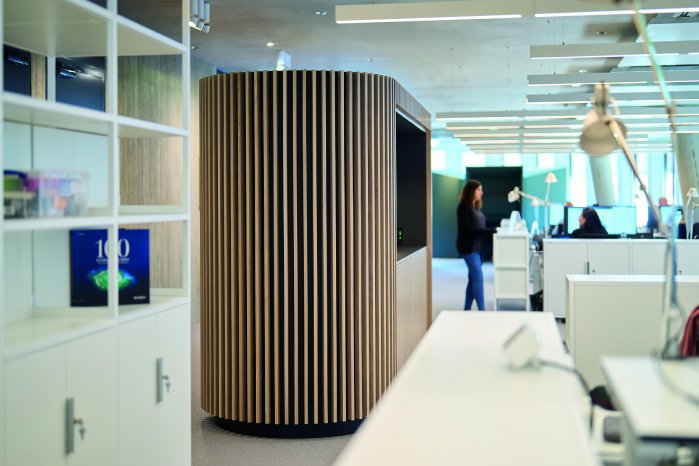"The concept of sustainability has dominated from the very beginning and significantly influenced the design. A variety of requirements had to be combined together and a coherent design developed covering all of the sustainability criteria," explains Jesper Bork, Project Manager at 3XN Architects. "We paid particular attention to the choice of materials. Every material used in the building has been tested and approved in the same way as the installed products. To be installed in Schüco One, the materials had to be subsequently recyclable and have good emission values." These efforts towards a sustainable building design, energy-saving operation and a healthy work environment have now been rewarded by DGNB, LEED and BREEAM, the three internationally recognised certification systems for sustainable construction.
Schüco One received the two most prestigious awards from the DGNB (German Sustainable Building Council): the platinum award for sustainability and the diamond award for cultural and design quality. DGNB is a non-profit organisation which promotes a future-oriented built environment. Its aim is to transform the construction and property industry, driving it towards an appropriate understanding of quality as the basis for responsible, sustainable trade. "The DGNB certification is seen as the most demanding certification system in the world. The project received a platinum award, which is the highest reward level, as well as the DGNB diamond award for exceptional design and cultural quality. This demonstrates the high sustainability requirements to which the new Schüco headquarters was planned and built," says Dr Christine Lemaitre, CEO of the DGNB.
Schüco One also received an award from the LEED label (Leadership in Energy and Environmental Design), which was developed by the US Green Building Council. The new headquarters was awarded the highest LEED certification, platinum, for the implementation of sustainability criteria in the categories Location and Transportation, Resource Efficiency, Energy and Atmosphere, Indoor Environmental Quality, Innovation and Materials.
The building managed to fulfil 80.48% of the assessment criteria for the BREEAM certificate. Schüco has already passed the so-called "assessor validation" and will officially be awarded with the BREEAM certification this summer. BREEAM (Building Research Establishment Environmental Assessment Methodology) is an assessment system for the ecological and sociocultural aspects of Sustainability for buildings which was originally developed in the UK. Different criteria were considered as part of the comprehensive assessment of Schüco One, including energy and water consumption, construction method and materials, and the building's ecological impact on the environment.
"Schüco One approached the question of climate change from the very beginning. Inspired by Cradle to Cradle, an exceptional solution was created which shows how good architecture and a holistic sustainability concept can be brought together," states Dr Peter Mösle, Partner at Drees & Sommer and Managing Director at EPEA GmbH.
A healthy and sustainable workplace
In addition to the three sustainability certifications, the verification of all the materials delivered to the construction site in accordance with the Sentinel Haus Institut standard confirms that the office building environment is very healthy. "Within the framework of our health-related quality management, all those involved in the project took part in intensive training. Training for the investors, planners and craftsmen, together with the products in our online platform Sentinel Portal which are tested in accordance with health requirements, the site inspections carried out by our Quality Managers, and the concluding ambient air measurements of the site all contribute towards a healthier work environment. The colleagues at Schüco benefit from this as well as the company itself, as it has more motivated workers and fewer illnesses," explains Peter Bachmann, Managing Director of the Sentinel Haus Institut.
What's more, the entire façade system is Cradle to Cradle-certified (C2C). The use of C2C-certified materials and products ensures that the building continues to be of value once it reaches the end of its useful life, as its components can be returned to the technical material cycle. This supports the circular economy and reduces the amount of waste in landfills.
Low-maintenance, efficient building services and ventilation technology
The innovative energy concept of Schüco One also plays its part in the certifications. The low-maintenance building services should ensure energy-efficient operation of the building. The heating requirements of Schüco One are primarily covered by the district heating network, but a geothermal heat pump is also available. The building is ventilated using a displacement ventilation system with integrated heat recovery. Employees can also open or close the windows themselves as necessary. Natural ventilation by means of manual window ventilation is therefore possible on all storeys and in nearly all workspaces.
Highly efficient building envelope
The façade construction in particular, which has been custom-built by Schüco Engineering, plays a crucial role in the sustainability of the building. It combines aesthetic qualities with the technical features of Schüco systems. The ground floor envelope is transparent on all sides and looks like a glass plinth, on top of which a folded sculpture sits. The top six floors consist of alternating transparent and opaque units, creating a dynamic look. The façade folds in and out like an accordion. This structure not only looks stunning, it also prevents the rooms inside from overheating. Nevertheless, the façade still allows the interior to be flooded with daylight. The same is true of the glass roof above the central atrium, for which a Schüco AOC add-on construction with a mechatronic roof window system has been used. Sun shading is provided by electrochromic SageGlass; when it is very sunny, the glass darkens and restricts solar heat gain, but remains transparent at all times, providing an unobstructed view of the sky.
Innovative character of the main façade
The façade combines aesthetics with innovative technology in a compact form. Its complex geometry was only made possible by digitally controlled production methods, which were further facilitated by the BIM-based design of the building. The high degree of prefabrication of the façade ensured that it could be installed on schedule. The main façade with its six upper floors is based on the Schüco AWS 75.SI+ window system. The façade has been designed as a special construction with a 90 mm basic depth and achieves the desired U value of 1.0 W/(m²K). The alternating fixed glazed units, side-hung windows with limiting stays and solid panels give the façade a sort of rhythm as well as its shape. The electrically-operated and system-integrated Schüco Integralmaster glare protection ensures that the workspaces remain free from glare in accordance with workplace guidelines. The external Schüco CSB sun shading on rollers ensures that the interior is provided with shade from the first to the sixth floor as well as on parts of the ground floor. Its guide track is concealed in the profile and a clear view of the outdoors is guaranteed at all times – even when the blinds are completely lowered. The terrace exits have been designed using AWS 90 window doors as a special construction.
The transparent plinth on the ground floor consists of various Schüco façade systems. The FWS 50 mullion/transom façade with the highest thermal insulation properties was used in the curved areas as well as in front of the rooms on the east side, while the FWS 35 PD Panorama Design façade was used on the flat areas next to the main entrance. All of the electrically operated components in the façade are centrally controlled, but can still be operated manually by employees at any time.
Green façade
In the entrance area on the ground floor, a section of green façade forms the transition area between Schüco One and the existing building, which was the former company headquarters. This green façade emphasises the sustainable nature of this construction project. The Schüco Green Façade system solution was used, in which plants take root and grow in a fleece-based material filled with substrate. Green façades like this clean the air, contribute to a positive micro and macro climate, and promote biodiversity.
Project details
Project title: New Schüco One company headquarters
Architects: 3XN Copenhagen A/S
Schüco fabricators:
Feldhaus Fenster+Fassaden GmbH & Co. KG, Emsdetten
Riedel & Söhne GmbH & Co. KG, Dortmund
Ventker Metallbau GmbH & Co. KG, Tecklenburg-Brochterbeck
Knaup Metallbau GmbH & Co. KG, Rheda-Wiedenbrück
Soreg AG, Wädenswill, Switzerland
Floor area: 1100 m2
Gross floor area: 8500 m²
Usable space: 7200 m2
Completion date: June 2022
Schüco systems used in the project:
Main façade, 1st to 6th floor:
Special construction with 90 mm basic depth, based on the Schüco AWS 75.SI+ window system.
Glare protection: Schüco Integralmaster internal roller blind solution
Sun shading: Schüco CSB external aluminium micro louvre blades with SMI drives
Monitoring of window opening: SensTrack wireless
Terrace exits: special window door construction based on Schüco AWS 90
Façade, ground floor:
Curved and flat areas on the east side: FWS 50 mullion/transom façade
Flat areas next to the main entrance: FWS 35 PD (Panorama Design) mullion/transom façade
Window facing the Welcome Forum: AWS 75 TipTronic window system
Green façade:
Schüco Green Façade system solution
Glass roof above the atrium:
Schüco AOC 75 add-on construction
Roof window: Schüco AWS 57 RO as a special construction with SageGlass sun shading
Rooftop access:
Façade system: Schüco AOC 60 add-on construction with curved panes
External door: Schüco ADS 75 SimplySmart
Interior partition walls:
FWS 35 PD mullion/transom façade
Doors: ADS 65
Doors in the core of the building/stairwell:
WC/ancillary rooms: Schüco ADS 75
Stairwell fire doors: Schüco ADS 80 FR 30
